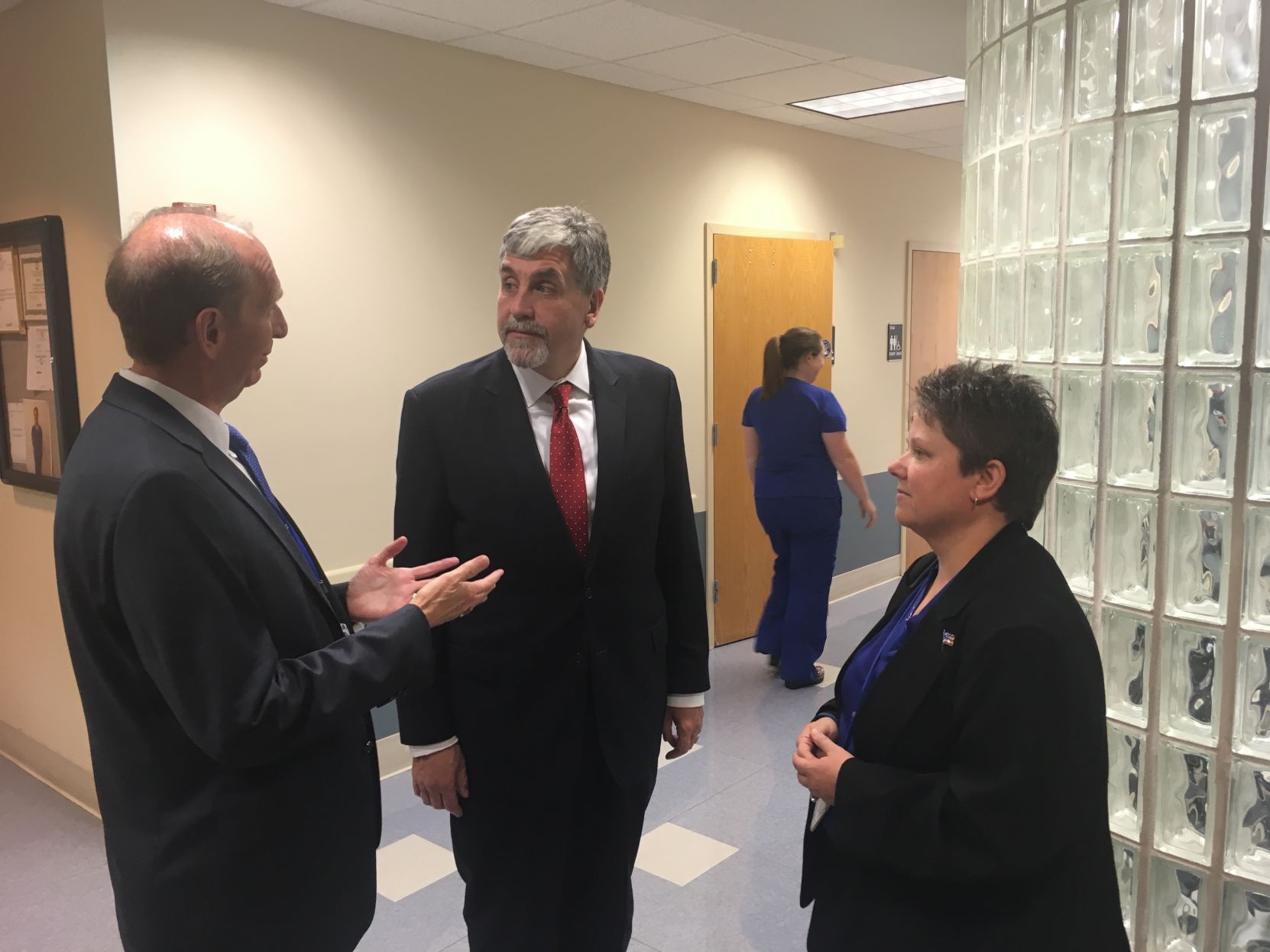LEXINGTON, Ky. (AP) — Advocates and doctors in opioid-ravaged Kentucky urged President Donald Trump’s acting chief health official to spend more money on fighting the drug epidemic one day after he signed an order declaring the crisis a national public
LEXINGTON, Ky. (AP) — Advocates and doctors in opioid-ravaged Kentucky urged President Donald Trump’s acting chief health official to spend more money on fighting the drug epidemic one day after he signed an order declaring the crisis a national public health emergency.
Acting Health and Human Services Secretary Eric Hargan toured a clinic in Lexington, Kentucky, on Friday that specializes in treating pregnant women and their babies addicted to opioid-based drugs like heroin and prescription painkillers.
Kentucky has one of the highest rates of babies born addicted to opioids, with 110 cases reported each month in 2015. Hargan met privately with patients and advocates before taking a tour of the facility and speaking with two reporters.
“A lot of what I heard in the room is we need resources, we need money,” said Alex Elswick, founder of a nonprofit that connects people to recovery resources who participated in the meeting.
Hargan also heard from health care providers worried about the potential loss of services that came to Kentucky with the expansion of Medicaid under the Affordable Care Act.
Although Congress last year authorized spending $1 billion over two years on state initiatives to fight the opioid crisis, the Trump administration’s public health declaration does not include more spending. Instead, it lets the government redirect resources to help out rural areas.
For example, the declaration seeks to let doctors treat more patients remotely, a critical service for rural areas that have few health care providers. Agatha Critchfield, an obstetrician-gynecologist who oversees a drug treatment program for pregnant women at the University of Kentucky’s hospital system, says some patients drive more than three hours for appointments.
But it’s unclear how or when Trump’s declaration will let doctors prescribe medication, like buprenorphine, remotely without a face-to-face visit. The medicine helps people addicted to opioids with the painful withdrawal symptoms that come with quitting the drug, but doctors have been banned from prescribing it unless they meet with a patient in person. Asked if the declaration will lift those restrictions, Hargan said the Drug Enforcement Administration would have to weigh in along with state health officials.
“Prescribing decisions … are really in the hands of the state and local authorities,” Hargan said. “We don’t regulate the practice of medicine at the federal level.”
The federal government, however, specifically the Substance Abuse and Mental Health Services Administration, which is part of HHS, does regulate the prescribing of buprenorphine. Doctors must get a waiver from the federal agency to prescribe the drug, which is a narcotic.
Hargan said he came to Kentucky because it has been one of the states most affected by the opioid crisis. Last year, Kentucky had more than 1,400 drug overdose deaths, a 39 percent increase from three years ago.
He praised Kentucky officials and advocates for working together to come up with “innovative, collaborative solutions.” And he said it was encouraging to meet patients who were working to overcome their addiction, saying it put “a human face on the crisis.”
“You put those two things together and you can find messages and treatment and ways of dealing with it that I think can be applied nationally,” Hargan said.
Critchfield said one of the biggest things to help Kentucky was the expansion of the Medicaid program under former President Barack Obama’s health care law, which the Trump administration is trying to eliminate. She said the vast majority of patients the program treats are on Medicaid.
“Whatever your feelings are about it, substance abuse services got better,” Critchfield said. “So from my perspective as a substance abuse provider for pregnant and early parenting women, they had improved access to medication-assisted therapy. And so, certainly, I have concerns about that going away.”
Hargan said substance abuse treatments were expanded with Medicaid, but said “going forward, I mean, you have to look to see what Congress does with the law itself.”
———
AP Medical Writer Carla K. Johnson contributed reporting from Chicago.


